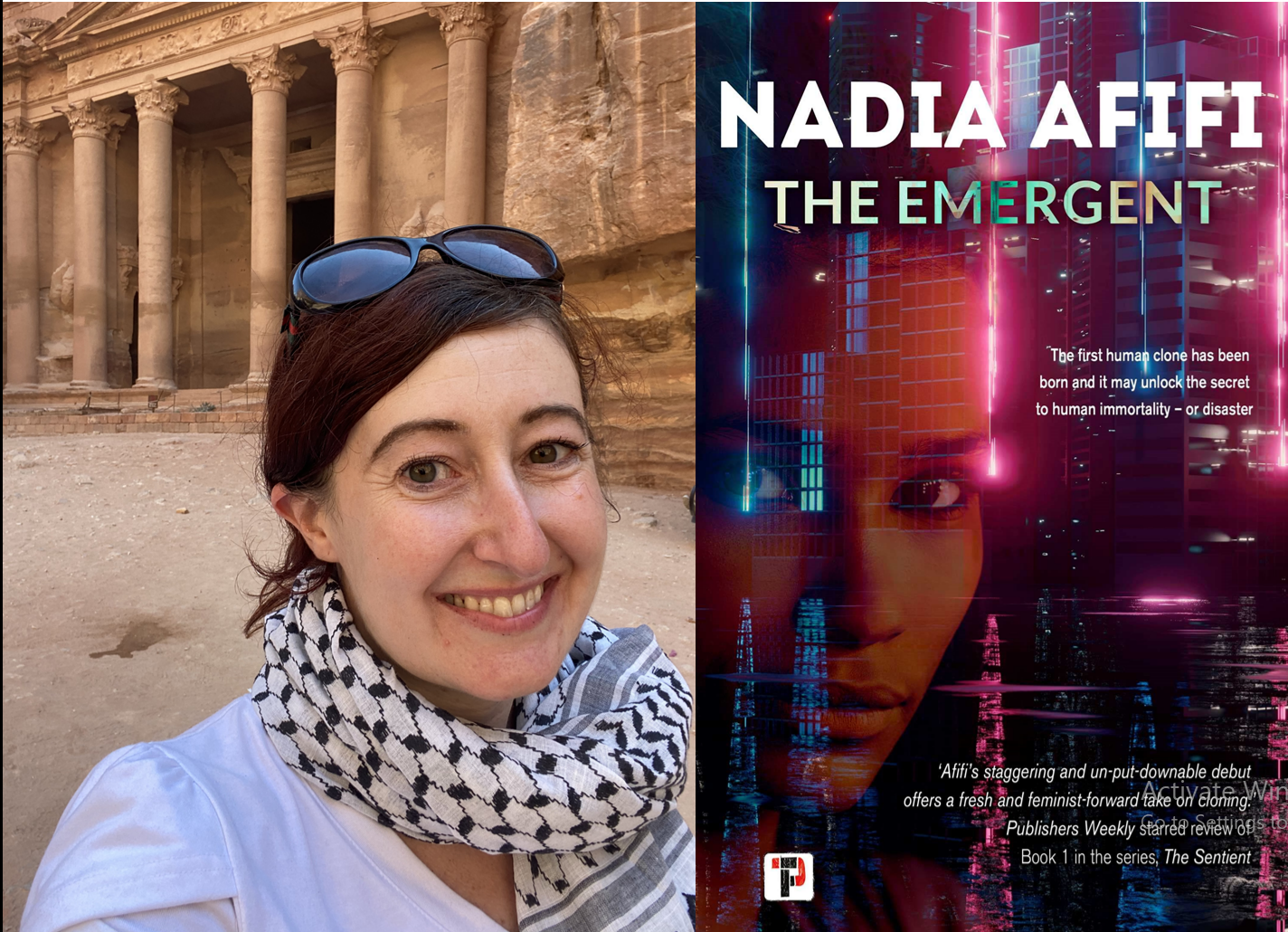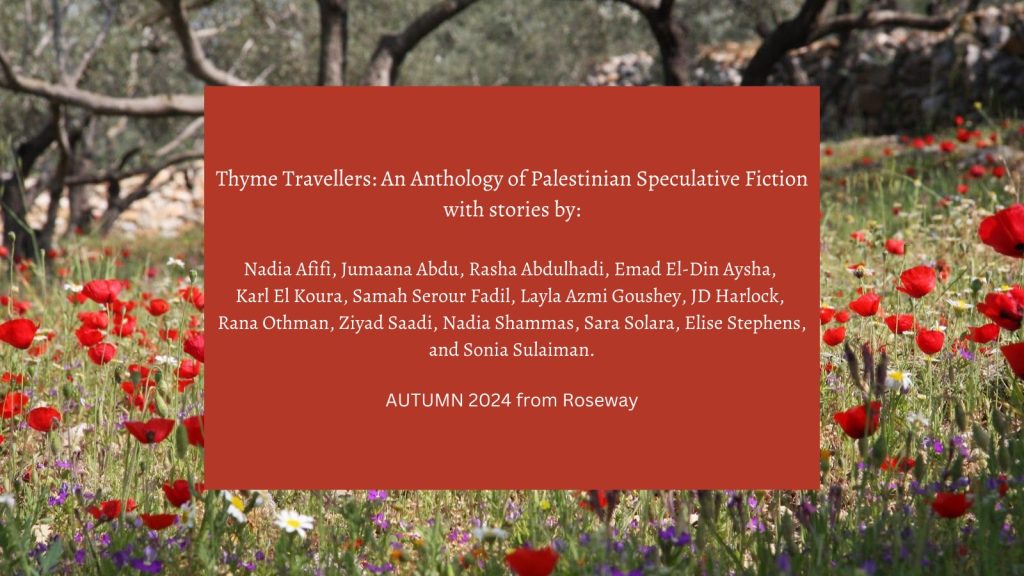
All this time, I’ve been lamenting the lack of Palestinian science fiction – I said that in my chapter in the McFarland book, having hit a brick wall with the Palestinian authors I’d contacted – and it seems that since the publication of Palestine + 100 (2019), there’s been a small explosion of it. Thank heavens for the tireless efforts of Layla Azmi Goushey and Sonia Sulaiman, who got me the definitive list - #ReadPalestinianSpecFic Reading List.
Hence this interview with fellow Palestinian Nadia Afifi, an author who broke onto the scene in 2020 and sporting her cyberpunk trilogy (Sentient, Emergent, Transcendent) starring neuroscientist and ex-cultist Amira Valdez. She’s from Denver, Colorado, Palestinian on her father’s side, and grew up in Bahrain. (I’m from the UK and grew up in Kuwait).
We had to talk.
What drew you to start reading and writing science fiction?
“I was born in the U.S. but spent most of my childhood in Saudi Arabia and Bahrain. My dad’s a Saudi national but Palestinian by birth – he was born in Jerusalem and spent his childhood there. My mom’s an American from Missouri.
Growing up, I read non-stop and knew from an early age that I wanted to be a writer, but it took me a while to realize that my calling was in science fiction. As a teenager in Bahrain, I read a lot of classics and saw literary fiction as the right kind of fiction for a “serious” writing career. I got over that in college and beyond when I got more exposure to science fiction that connected with me – Ursula LeGuin, Kurt Vonnegut, Paolo Bacigalupi, Octavia Butler, and others.
Living and traveling overseas also helped… it made me yearn to read more international sci-fi and fantasy in terms of themes and voice, and if I couldn’t find it, I realized I could write it myself.”
How would you define cyberpunk? Is it your favorite subgenre?
“I see it as a combination of shiny technology and grit and of people navigating futures where that technology (AI, virtual reality, etc.) can mean liberation, escape, or something dangerous.
For me, cyberpunk is cities with bright, neon lights and seedy underbellies. The world may be advanced in some ways, but often, people are left behind. I know it’s commonly characterized as dystopian, but I don’t love that idea – I never saw my first novel, The Sentient, as dystopian. It’s a world with good and bad aspects, like our present, and the characters navigate it as best they can.
Cyberpunk is one of my favorites, although I’m a fan of most subgenres of sci-fi – space operas, near-future, biopunk, etc. I’m drawn to complex, exciting world-building and well-meaning but flawed characters, so any sci-fi with those elements will grab my attention.”
Now what about Amira Valdez. Is she ‘you’ in disguise?
“I injected parts of myself into Amira and the other two main female characters in the first novel, Rozene Hull and Dr. Valerie Singh. Amira is stoic, ambitious, and fiercely loyal to the people around her, but she also tries a little too hard to convince herself and others that she’s ok at all times, which are all traits I have.
In the first novel, she also tends to see things in black and white, accompanied by a strong desire to fit into her adopted home, which the younger me could relate to. I’d love to say I have her bravery, but I wouldn’t last a day in her shoes.”
Do you like bringing the Arab world to the English-language reader, as in “The Bahrain Underground Bazaar (2020)”?
“I loved it! I’m still amazed by my success with that short story and all of the readers who shared how they connected with it. It’s set in two Arab countries near and dear to my heart – Bahrain and Jordan. I spent seven years as a kid and a teenager in Bahrain and spent many vacations visiting family in Jordan.
I wanted to portray a futuristic version of Bahrain that felt familiar to me – a logical offshoot of what the island is now and what it could be. I’ve always connected with Petra since I first visited the site as a child, so it was easy to write a character who went there searching for answers to impossible questions. The main character, Zahra, was a composite of my two grandmothers – one Irish-American and one Palestinian, but both resilient, loving storytellers.”
How did you get to know editor, author, and illustrator Sonia Sulaiman? And what about the future of Palestinian SFF?
”We connected through Twitter – I appreciated her threads on Palestinian folktales, and reached out to her when she supported Fiyah magazine after they showcased Palestinian authors. She’s a beautiful voice and advocate for Palestinian authors in science fiction.
It’s been a difficult few months, so it’s hard to be optimistic as a Palestinian in general – but I am stubbornly, defiantly optimistic about Palestinian voices in SFF.

VEGETATIVE GROWTH: Another Sonia Solaiman contribution to Palestinian speculative fiction. Check out my name there too!
When I was growing up, I experienced the casual dehumanization and bigotry that was the norm then – I’d been told that “there’s no such thing as Palestinians” and had the usual draining conversations about “the conflict” where I was never given a chance to provide context or personal experience.
Back then, I never could have imagined that there would be Palestinian-themed editions of Strange Horizons and Fiyah, that authors would be writing sci-fi that was unapologetically Arab and Palestinian in its themes and ideas. And there’s an interest in it and a hunger for more diverse voices and decolonized SFF across the board. We are part of that story and here to stay.”






